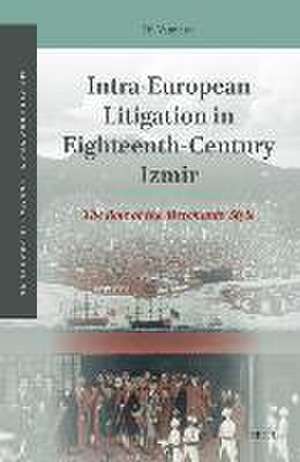Intra-European Litigation in Eighteenth-Century Izmir: The Role of the Merchants’ Style: Mediterranean Reconfigurations, cartea 4
Autor Tijl Vannesteen Limba Engleză Hardback – 3 noi 2021
Preț: 590.66 lei
Preț vechi: 720.31 lei
-18% Nou
Puncte Express: 886
Preț estimativ în valută:
113.04€ • 117.58$ • 93.32£
113.04€ • 117.58$ • 93.32£
Carte indisponibilă temporar
Doresc să fiu notificat când acest titlu va fi disponibil:
Se trimite...
Preluare comenzi: 021 569.72.76
Specificații
ISBN-13: 9789004382701
ISBN-10: 9004382704
Dimensiuni: 155 x 235 mm
Greutate: 0 kg
Editura: Brill
Colecția Brill
Seria Mediterranean Reconfigurations
ISBN-10: 9004382704
Dimensiuni: 155 x 235 mm
Greutate: 0 kg
Editura: Brill
Colecția Brill
Seria Mediterranean Reconfigurations
Notă biografică
Tijl Vanneste, Ph.D. (2009), researcher at the Portuguese Institute of International Relations (IPRI) of the Universidade Nova de Lisboa. His current research is about women’s labour in the diamond industry. He has worked extensively on early modern cross-cultural trade networks.
Cuprins
Acknowledgements
List of Illustrations
Introduction
1The Dutch in the Levant
1 The Early Development of Dutch Levant Trade
1.1 Straatvaart: Dutch Navigation into the Mediterranean
1.2The Directorate of Levant Trade and European Competition
2 The Dutch Levantine Institutional Context
2.1A Short History of the European Capitulations
2.2The Dutch Consular System in the Levant
3 The Dutch Consulate of Izmir
3.1The Evolution towards Stability
3.2The Consular Protection of Jews
3.3Purchasing Protection: The Beratlıs or Honorary Dragomans
4 The Dutch Trading Community of Izmir in the Eighteenth Century
4.1A Community of Competing Traders
4.2Levantine Commission Trade
2The Dutch Consular Court of Izmir
1 Consular Jurisdiction
1.1Adjudication in the Capitulations
1.2The Establishment of Consular Jurisdiction
1.3A Proposal to Codify Adjudication in the Levant
2 The Dutch Legal Context
2.1Sources of Roman-Dutch law
2.2The Diversity of Jurisdictions and the Similarity of Courts
3 Procedures in Commercial Litigation
3.1Dutch Regulations on Procedure
3.2Summary Procedure and the Merchants’ Style
3.3Summary Procedure at the Dutch Consular Court of Izmir
3The Adjudication of Commercial Disputes within the Dutch Community
1 Adjudication amongst Peers: The Use of Arbitration
1.1The Friendly Settlement of Local Troubles
1.2A Failed Attempt at Arbitration
2 The Mother of Levantine Trade Quarrels: Disputing Commission Trade
2.1The Principal-agent Problem
2.2Commission Trade Gone Wrong
2.3Whose Responsibility Is It?
3 Friendship on Trial
3.1The Bond between Merchants
3.2The Mutual Pursuit of Profit
3.3International Support for the Merchants’ Style
4Intra-European Litigation
1 Belonging to a European Trade Nation Abroad
1.1 Forum Rei and a Clash of Laws
1.2Competition from within: The Prussian Company
1.3A Local European Dispute without Any Dutch Involvement
1.4The Possibility of Appeal
2 Unravelling the Web of Commission Trade in Court
2.1Crossing Physical Distance by Power of Attorney
2.2The Trial
2.3A Complicated Web of Entanglement
2.4Invoking ‘National’ Law versus the Merchants’ Style
3 Litigants at Sea and Maritime Jurisdiction
5Ottomans at the Dutch Consular Court
1 Levantine Confrontations with the Law
1.1Sequesters in 1686
1.2Central Courts in the United Provinces
1.3The States General and Ottoman Justice
2 Legal Issues of Dutch Protection and Subject Status
2.1 Beratlı Problems
2.2Ottoman-Dutch Intercultural Partnerships
3 The Most Cosmopolitan Form of Quarrelling
3.1Gerrit van Brakel’s Bill of Exchange
3.2Ottoman justice and European Protection
4 An Islamic Merchants’ Style?
4.1European Fear of Ottoman Abuses
4.2Greek Community Resolutions
4.3The Merchants’ Style through Muslim Eyes
Conclusion
Bibliography
Index
List of Illustrations
Introduction
1The Dutch in the Levant
1 The Early Development of Dutch Levant Trade
1.1 Straatvaart: Dutch Navigation into the Mediterranean
1.2The Directorate of Levant Trade and European Competition
2 The Dutch Levantine Institutional Context
2.1A Short History of the European Capitulations
2.2The Dutch Consular System in the Levant
3 The Dutch Consulate of Izmir
3.1The Evolution towards Stability
3.2The Consular Protection of Jews
3.3Purchasing Protection: The Beratlıs or Honorary Dragomans
4 The Dutch Trading Community of Izmir in the Eighteenth Century
4.1A Community of Competing Traders
4.2Levantine Commission Trade
2The Dutch Consular Court of Izmir
1 Consular Jurisdiction
1.1Adjudication in the Capitulations
1.2The Establishment of Consular Jurisdiction
1.3A Proposal to Codify Adjudication in the Levant
2 The Dutch Legal Context
2.1Sources of Roman-Dutch law
2.2The Diversity of Jurisdictions and the Similarity of Courts
3 Procedures in Commercial Litigation
3.1Dutch Regulations on Procedure
3.2Summary Procedure and the Merchants’ Style
3.3Summary Procedure at the Dutch Consular Court of Izmir
3The Adjudication of Commercial Disputes within the Dutch Community
1 Adjudication amongst Peers: The Use of Arbitration
1.1The Friendly Settlement of Local Troubles
1.2A Failed Attempt at Arbitration
2 The Mother of Levantine Trade Quarrels: Disputing Commission Trade
2.1The Principal-agent Problem
2.2Commission Trade Gone Wrong
2.3Whose Responsibility Is It?
3 Friendship on Trial
3.1The Bond between Merchants
3.2The Mutual Pursuit of Profit
3.3International Support for the Merchants’ Style
4Intra-European Litigation
1 Belonging to a European Trade Nation Abroad
1.1 Forum Rei and a Clash of Laws
1.2Competition from within: The Prussian Company
1.3A Local European Dispute without Any Dutch Involvement
1.4The Possibility of Appeal
2 Unravelling the Web of Commission Trade in Court
2.1Crossing Physical Distance by Power of Attorney
2.2The Trial
2.3A Complicated Web of Entanglement
2.4Invoking ‘National’ Law versus the Merchants’ Style
3 Litigants at Sea and Maritime Jurisdiction
5Ottomans at the Dutch Consular Court
1 Levantine Confrontations with the Law
1.1Sequesters in 1686
1.2Central Courts in the United Provinces
1.3The States General and Ottoman Justice
2 Legal Issues of Dutch Protection and Subject Status
2.1 Beratlı Problems
2.2Ottoman-Dutch Intercultural Partnerships
3 The Most Cosmopolitan Form of Quarrelling
3.1Gerrit van Brakel’s Bill of Exchange
3.2Ottoman justice and European Protection
4 An Islamic Merchants’ Style?
4.1European Fear of Ottoman Abuses
4.2Greek Community Resolutions
4.3The Merchants’ Style through Muslim Eyes
Conclusion
Bibliography
Index



